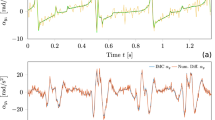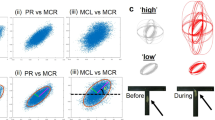Abstract
THE results of 24-hr, rhythm measurements are frequently influenced by perturbations due to the presence of an observer and the measuring equipment. These perturbations can be minimized if the desired physiological data are obtained by radio telemetry1,2. The transmitter carried by the animal should be characterized by small size, long battery life, and sufficient range for unrestrained movements. Several transmitters with these design goals were constructed successfully and used to relay temperature and heart-rate information to a distant observer.
This is a preview of subscription content, access via your institution
Access options
Subscribe to this journal
Receive 51 print issues and online access
$199.00 per year
only $3.90 per issue
Buy this article
- Purchase on Springer Link
- Instant access to full article PDF
Prices may be subject to local taxes which are calculated during checkout
Similar content being viewed by others
References
Gold, D. C., Malcolm, J. L., J. Physiol., 135, 5P (1957).
Jacobson, B. S., and MacKay, R. S., Lancet, i, 1224 (1957).
Essler, W. O., and Folk, jun., G. E., Animal Behavior (in the press).
Author information
Authors and Affiliations
Rights and permissions
About this article
Cite this article
ESSLER, W., EDGAR FOLK, G. Determination of Physiological Rhythms of Unrestrained Animals by Radio Telemetry. Nature 190, 90–91 (1961). https://doi.org/10.1038/190090a0
Issue Date:
DOI: https://doi.org/10.1038/190090a0
This article is cited by
-
Role of the suprachiasmatic nuclei of the hypothalamus on diurnal rhythm in cardiac arrhythmias
Heart and Vessels (1986)
Comments
By submitting a comment you agree to abide by our Terms and Community Guidelines. If you find something abusive or that does not comply with our terms or guidelines please flag it as inappropriate.



